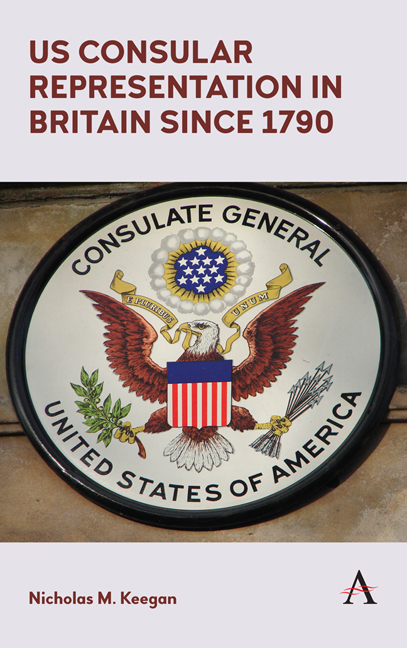Book contents
- Frontmatter
- Dedication
- Contents
- List of Illustrations
- Foreword
- Preface
- Acknowledgements
- Introduction
- PART 1
- PART 2
- PART 3
- Chapter Six Consular Posts and Consular Agencies in Major Cities
- Chapter Seven Belfast
- Chapter Eight Birmingham
- Chapter Nine Bradford
- Chapter Ten Bristol
- Chapter Eleven Cardiff
- Chapter Twelve Dublin
- Chapter Thirteen Dundee
- Chapter Fourteen Dunfermline
- Chapter Fifteen Edinburgh and Leith
- Chapter Sixteen Falmouth
- Chapter Seventeen Liverpool
- Chapter Eighteen London
- Chapter Nineteen Newcastle upon Tyne
- Chapter Twenty Southampton
- Chapter Twenty-One Stoke on Trent
- Chapter Twenty-Two An Evolving, Adaptive Service
- Appendix: Locations and Categories of Consular Offices
- Notes
- Sources
- Bibliography
- Index
Chapter Eight - Birmingham
from PART 3
Published online by Cambridge University Press: 21 June 2018
- Frontmatter
- Dedication
- Contents
- List of Illustrations
- Foreword
- Preface
- Acknowledgements
- Introduction
- PART 1
- PART 2
- PART 3
- Chapter Six Consular Posts and Consular Agencies in Major Cities
- Chapter Seven Belfast
- Chapter Eight Birmingham
- Chapter Nine Bradford
- Chapter Ten Bristol
- Chapter Eleven Cardiff
- Chapter Twelve Dublin
- Chapter Thirteen Dundee
- Chapter Fourteen Dunfermline
- Chapter Fifteen Edinburgh and Leith
- Chapter Sixteen Falmouth
- Chapter Seventeen Liverpool
- Chapter Eighteen London
- Chapter Nineteen Newcastle upon Tyne
- Chapter Twenty Southampton
- Chapter Twenty-One Stoke on Trent
- Chapter Twenty-Two An Evolving, Adaptive Service
- Appendix: Locations and Categories of Consular Offices
- Notes
- Sources
- Bibliography
- Index
Summary
Birmingham is a large important city in the midlands. American consular representation there began in 1836 when Alfred Burrish, a local businessman, was appointed consular agent. He was succeeded in 1840 by another local businessman, John Mason Guest Underhill, who served until 1865, but it was not until 1865 that the first American citizen was appointed agent; he was Elihu Burritt of Connecticut. A philanthropist, he was nicknamed ‘the learned blacksmith’ because that had been his earlier career; before taking up his appointment he was heavily involved in world peace movements and other causes. He served until 1869, when another American, J. B. Gould of Maine, was appointed consul. Gould had previously been nominated as consul in Cork but for some reason the appointment had not been taken up. By the time of his appointment to Birmingham there were consular agencies in Leicester, Wolverhampton, Kidderminster and Redditch that reported directly to him.
Birmingham was one of the busiest consulates in Britain. In the year ended 30 September 1871 the value of goods exported to the United States and verified by the consulate and its agencies was almost $8 million. The fee income from certifying the invoices for exported goods earned the consulate and agencies more than $12,000 for the year ended 30 June 1872. In 1878, Eugene Schuyler, a high flier in the Consular Service, arrived in place of Sevellon A. Brown, Chief Clerk of the State Department, who had been nominated but had declined the appointment. Schuyler was an expert on Russia and Central Asia and during the previous 11 years had held posts in Moscow, Reval (renamed Tallinn, Estonia), St Petersburg and Constantinople. Given his background it was obvious that he would not remain long in Birmingham and, indeed, he left the following year. However, during his short time in Birmingham he occupied himself by finishing his translation of Tolstoy's novel The Cossacks. Later in his career he wrote American Diplomacy, which became a standard work on US foreign affairs. In 1879, Wilson King, of Pennsylvania, consul at Bremen, was appointed.
- Type
- Chapter
- Information
- US Consular Representation in Britain since 1790 , pp. 101 - 108Publisher: Anthem PressPrint publication year: 2018

